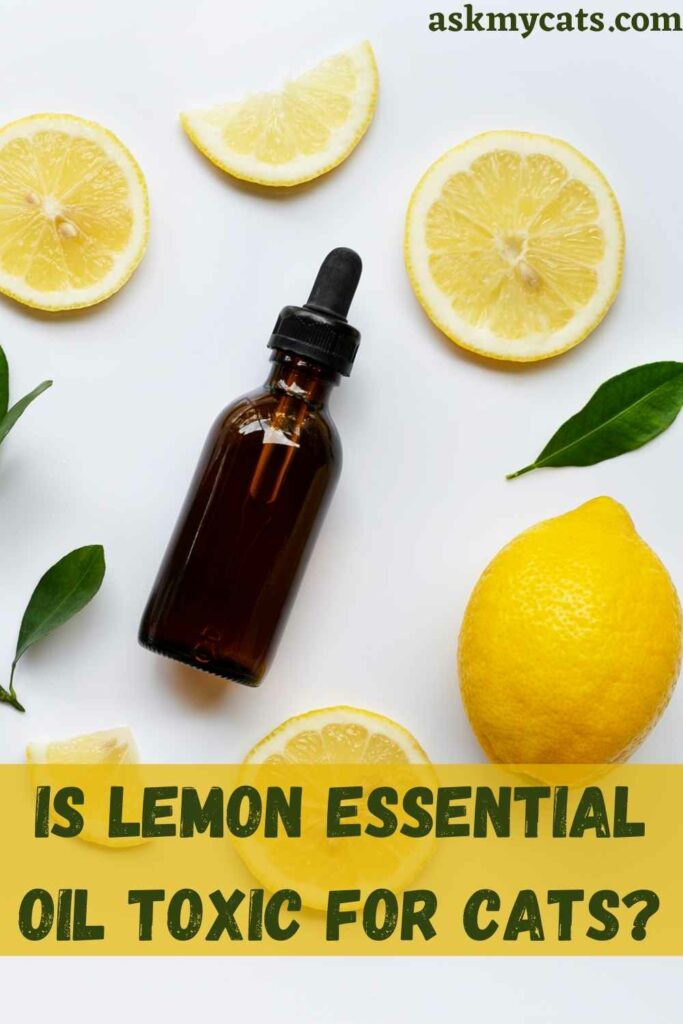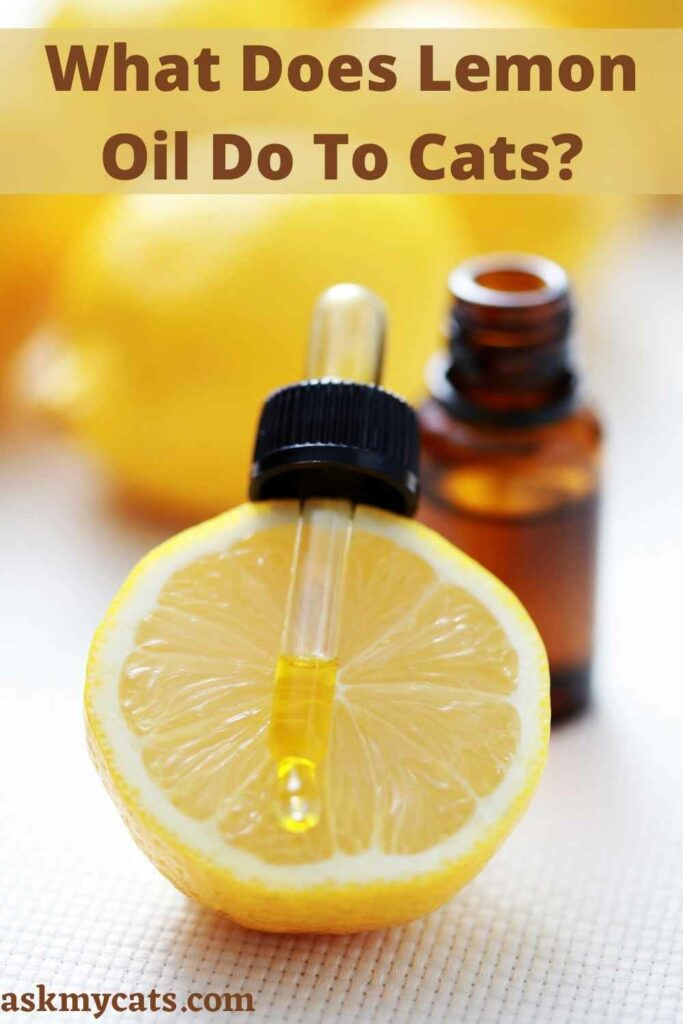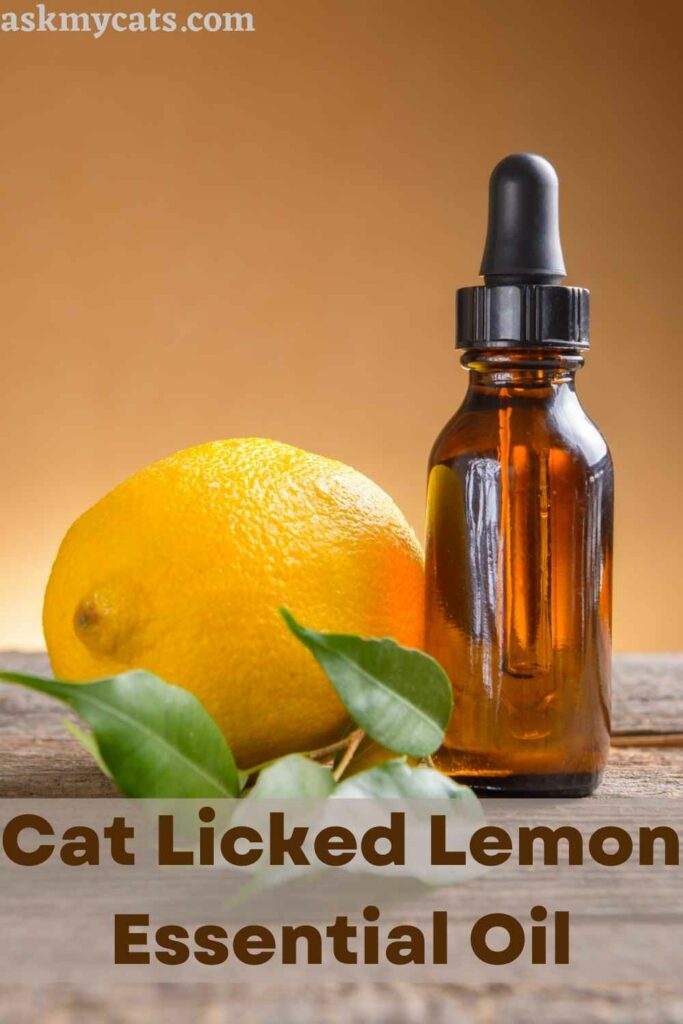As society as a whole continues to say no to drugs and explore holistic healing opportunities, why not extend the benefits to our beloved cats? What if, instead of an anti-anxiety medication, a little lavender could go a long way? Natural oils have grown in popularity in recent years.
Before you begin, consider which essential oils are safe for cats and other pets such as dogs. Because their sense of smell is so much stronger than ours, scents (even natural ones) can be harmful to them.
So, is lemon essential oil safe for cats?
No, lemon essential oil is not safe for cats. Lemon essential oil is toxic to cats when applied to the skin or diffused. Lemon oil and clove oil (both of which are commonly used for natural flea control) have been linked to liver damage, vomiting, diarrhea, seizures, and other problems.
This article will talk about is lemon essential oil safe for cats, and how to keep cats away from it.


Give Your Cat the Perfect Day
Get the Free Ebook!
What Is Lemon Essential Oil?
Lemon essential oil is extracted from the peel of fresh lemons through steam extraction.
Lemon essential oil is an entirely natural ingredient that can also be used as a home remedy. It is extracted from the peel of fresh lemons using steam or, less frequently, a “cold-pressing” process that pricks and rotates the peel as the oil is released.
Lemon essential oil can be applied topically to the skin, diffused into the air, and inhaled. Some people swear by lemon essential oil as a remedy for exhaustion, depression, clearing the skin, killing harmful viruses and bacteria, and reducing inflammation.
In recent years, the medical literature has begun to catch up with claims made by people who have been using lemon essential oil for years.
Is Lemon Essential Oil Toxic For Cats?
Yes, lemon essential oil is toxic for cats.

In studies, essential oils such as lemon oil have been shown to be toxic to cats, whether taken internally, applied to the skin, or simply inhaled.
As a result of exposure, severe liver damage, liver failure, respiratory failure, seizures, and even death can occur.
Felines lack specific enzymes that allow them to properly process various compounds found in essential oils, particularly phenols (a process known as “gluconuridation”).
The liver is the organ most susceptible to failure because phenolic compounds are found naturally in plants and concentrated in essential oils.
Airborne essential oils from essential oil and aromatherapy diffusers, candles, liquid potpourri products, and room sprays can be inhaled or licked off their fur.
If you can smell oil, there is oil in the air, which can cause respiratory issues.
Here are some general guidelines for using lemon essential oil with your feline companions in your home: –
- Lemon essential oil should not be applied or fed to cats directly, nor should it be left in areas where they might come into contact with it. While some oils are insect repellent and smell great, your cat is at risk of serious or fatal reactions. It will be appreciated by your curious pet.
- If your cat has asthma, allergies, or other respiratory issues, avoid using lemon essential oil.
- Keep cats away from rooms that have a lot of lemon essential oil. Essential oil diffusers should not be used in rooms with kittens, elderly cats, or cats with liver or respiratory problems.
What Does Lemon Oil Do To Cats?
If your cat ingested lemon oil, it will show signs of poisoning such as vomiting, stomach upset, and lack of coordination.

Look for signs of a lack of coordination. If your cat has been poisoned by essential oils, it may be unable to walk properly.
It might trace a crooked line across the floor, weaving this way and that, as if inebriated.
In less severe cases, you may notice a general slowness of motion or a lack of energy.
Keep an eye out for tremors in your cat. Your cat may shiver or shake as a result of poisoning.
In cats, essential oil poisoning can cause seizures, which are a very violent form of uncontrollable shaking.
Your cat’s seizure is a medical emergency, and you should contact your veterinarian as soon as possible.
Keep an eye on the temperature of your cat. When you notice tremors in your cat, they may or may not be linked to a drop in its core body temperature.
Take your cat’s temperature with a pet thermometer if you notice it shaking. Your cat’s body temperature is around 101.5 degrees Fahrenheit (39 degrees Celsius)
Examine your skin for any signs of irritation. Essential oil poisoning in cats can also cause skin irritation and redness.
This is especially true if the skin of the cat has been treated with essential oils. Swelling, bumps, blistering, or redness may appear on the lips, tongue, and gums.
Examine your cat’s eating habits to see if there are any problems. Essential oil poisoning could be the cause of your cat’s vomiting.
You’re probably dealing with essential oil poisoning if the cat’s vomit smells like the essential oil he was recently exposed to. A sudden loss of appetite or disinterest in eating is a less serious symptom related to digestion.
Cat Licked Lemon Essential Oil
If your cat licked lemon essential oil contact your vet immediately and get her to immediate medical care.

It is critical that a diagnosis and treatment are obtained as soon as possible.
Contact your veterinarian or the Pet Poison Helpline (800-213-6680), a 24-hour animal poison control center, if you suspect your cat has consumed lemon oil.
The sooner you get your cat treated, the better the prognosis and outcome.
Do not force your cat to vomit or administer activated charcoal to him.
This could aggravate your cat’s condition. Put the product packaging in a sealed container and bring it with you to the veterinary clinic.
If any product gets on your skin or fur, wash it off with a liquid dishwashing detergent as soon as possible.
Chemicals in lemon essential oil are quickly absorbed through the skin or orally. The liver is in charge of many of these chemical’s metabolism.
Because cats lack the liver enzymes required to effectively metabolize essential oils, they are particularly sensitive to them.
Furthermore, kittens and young cats, as well as cats with liver disease, are more susceptible to their harmful effects. The skin and mouth may be irritated or burned by lemon essential oil.
Do Cats Like The Smell Lemon Of Essential Oil?
Whether or not a cat enjoys the scent of lemon essential oil is entirely dependent on the cat and its personality.
The aroma of lemon essential oil does not appear on either the list of popular scents that cats dislike or the list of popular scents that cats prefer.
This can be revealed by using lemon essential oil in your home and near your cat. Check to see if your cat is purring and walking around close to the diffuser. If you answered yes, your cat enjoys the scent of lemon essential oil.
How To Dilute Lemon Essential Oil?
For cats, the best way to dilute lemon essential oil is to combine 9 parts carrier oil with 1 part lemon essential oil.
Always consult your veterinarian before using lemon essential oils topically on your cat. This will prevent you from accidentally using a product that could harm your four-legged companion.
Also, because lemon essential oil is toxic to cats, it should never be given to them. This means you shouldn’t put it on your cat’s legs or paws, where it could be licked.
It’s also worth noting that these oils must first be diluted. Use a carrier oil that you know is safe for cats, and seek professional advice if you have any questions.
Final Words
If you’re considering bringing lemon essential oil into your home, reconsider. Do your homework and discuss it with your family veterinarian. Every cat is unique. Never apply known irritants directly to your cat’s skin, and call the Pet Poison Helpline if your cat becomes poisoned.
If you have any additional questions, please post them in the comments section.
